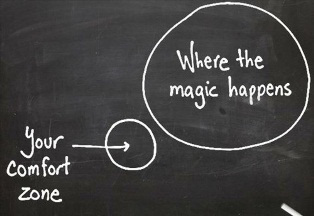If you’ve been following my content, you would have seen that I engage in creating challenger sales and marketing content. For example, my article “CMOs Are Failing to Go Beyond Brand Awareness,” questions the actions of CMOs at organizations like Xerox, Wiley, Lithium, G2Crowd, and XOJet. And, in my recent series, I question the thoughts, ideas, actions and content of well-known LinkedIn marketing experts like Viveka von Rosen, social media experts like Jay Baer and David Meerman Scott and social selling experts like Kurt Shaver. Click here to read part 1 which has over 3600 views and you can click here to read part 2.
Why Would I Be So Provocative and Challenge My Prospects’ Approach?
According to the CEB, challengers outperform all other seller profiles. 40% of top performers are challengers–those that close deals through their ability to lead, teach, and push the buyer. These sales professionals challenge common practices, thoughts and approaches. They take control of the sales conversation–rather than reacting to the buyer’s agenda.
Now, when it comes to social media, B2B buyers (especially IT buyers) do not want to engage with sales until they are ready to make the buying decision. You need to take control with the content you are putting on the LinkedIn publishing platform–and through the discussions you create.
You see, we know that studies show that only 1 in 5 sales and marketing leaders can clearly demonstrate and prove a social media ROI. Through the content we’re publishing and through the discussions we’re starting in our Get Help with Linked Strategies group, we’re showing prospects how they are just taking “brand awareness” actions and how that’s not leading to revenue and ROI. Because we’re using very specific examples that discusses the actions marketers are taking on LinkedIn–and showing “how” and “why” those actions are not delivering results, our prospects are questioning their own approach.
When you get prospects to question themselves, you get them to open up to new alternatives. You drive demand and you get them to take next step actions. For example, our LinkedIn publishing platform post, “Most LinkedIn Profiles Are Worthless as Sales and Marketing Tools” has doubled our monthly projects revenue.
You see we’re not focused on views. We’re not just focused on educating prospects. I always want to give up-front value, but at the same time, I want to drive demand. You’re not going to drive demand and create next step actions beyond the click, like or comment by just giving the same tips, mistakes, and information.
Need more proof that you need to take a challenger approach with your content and discussions on LinkedIn? Read this case study on how a messaging and positioning firm gained a $30,000 client using the Challenger approach.
Why Would I Be So Provocative in Challenging My Competitors and Peers?
Now, I may be harsh on the social media experts I mentioned in my “Social Media Experts Are Getting LinkedIn Wrong” series and I may have come down strong on them. But I’m not bashing them (even though I have been accused of that): I did not engage in name calling and I did not speculate and make up lies for my own gain. I simply challenged their ideas, actions, thoughts and content that they have made very public.
Why?
Because I wanted to engage in click-bait marketing where I just wanted to build controversy to get views? Despite what others are saying–no, I did not!
I wanted sales and marketing leaders who are accepting the status quo to question the approaches they’re following–even if it’s being suggested by a well-known, well-recognized expert.
Yes, I could have left names out of the articles–and made it more general. But then it doesn’t become “real” for the reader; business, sales and marketing leaders would have read the article and moved onto the next one without a second thought. But by getting specific and pinpointing the specific faults in the thoughts, ideas and actions of experts that many are following, we got prospects to stop in their tracks. And, because they started to question the approach, they signed up for the “Going Beyond Brand Awareness on LinkedIn” webinar we did with Biznology so they can learn an alternative approach. More than 100 people signed up for the webinar with a number of them now engaging in sales conversations with my LinkedIn marketing firm – GetLinkedInHelp.com. I also gained an opportunity to create courses for Digital Marketing Institute, as they saw how businesses can drive revenues with a different approach that’s designed for complex sales processes.
You see, I differentiated myself and my firm from others as I clearly show how social media firms are simply playing a numbers game and how they are failing to qualify and validate leads. And, most importantly, we drove demand.
Why I Say You Need to Engage in Debate?
With my “Social Media Experts Are Getting LinkedIn Wrong” series, I actually gave the different experts an opportunity to prove me wrong and to challenge my own ideas. Now, instead of defending their thoughts, ideas, actions and content and showing their thought leadership by commenting on the blog posts and inside the different discussions—most of the social media experts above whined.
You see, I gave them an opportunity to demonstrate their own thought leadership and to show how their approaches, that I criticized, are getting results by entering the debate through commenting on my posts and in the different discussions. But they failed to take that opportunity. Instead they blocked me from viewing their social media profiles, threw me out of their LinkedIn groups, ran away from the issues with tweets like “let’s just agree to disagree” or simply ignored it. One of the experts even wrote a post on how you shouldn’t bash your competitors on LinkedIn, but she didn’t defend the templates that she coaches followers to use.
Most of the social media experts became wusses.
Why would they not step up? Why would they not engage in a “social” conversation that allows them to discuss case studies that prove that their approach works? Why would they not take advantage of the platform that I just gave them? Do you see the opportunity that they missed?
Now think about the opportunities you’re missing by not creating and engaging in debates with your content and social media discussions? Don’t you think it’s time to go beyond brand awareness on LinkedIn?
Click here to watch the LinkedIn webinar we did with Biznology.






